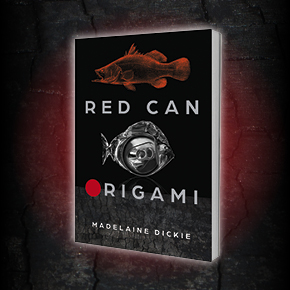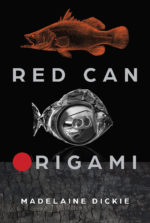Read this and be smarter: be awed by country and get drawn into a web of competing interests in regional northern Australia in Madelaine Dickie’s thrilling novel Red Can Origami.

From the rodeos and fishing holes of northern Australia to the dazzling streets of night-time Tokyo, Red Can Origami is a gripping tale of love, loss, land and identity.
We’re just three weeks away from the 2020 City of Fremantle Hungerford Award being open for entries. In this novel by former Hungerford winner Madelaine Dickie, journalist Ava takes a job in a remote community in Australia’s north, but she soon finds herself caught up in a bitter dispute between the local Indigenous community and a Japanese uranium mining company and falls in love with the dangerous beauty of the Kimberley along the way.
*****
On the way to the fishing spot, you all pull in to one of the big-ticket gorges. Cliffs slide like lava into a deep green waterhole. You’re the second of the group to bomb it—leaping off one of the higher rocks in a mad surge of beery adrenaline.
The water hurts when it hits, has a deadness to it, so different to the sway of the sea, the buoyancy of salt. It’s scary, contemplating what might lurk a hundred metres below your toes. What blind yabbies, what prehistoric, unclassified fish.
Four hours later, the sun’s setting, dripping like molten coffee over stone country. You’re in the troopie listening to Thievery Corporation in what you imagine is a companionable, perhaps even an intimate silence, when Ash says casually,
—I caught up with your sister when I was in Melbourne over Chrissy.
He’s nudging the car slowly over river rock. The water’s up to the doorhandles. There are No Swimming and Danger: Crocodiles inhabit this area signs on both banks.
She didn’t say anything, the little shit!
—Nice place she’s got.
An apartment in Brunswick. Windows that spill snow-pale light. Furniture elegant and blanched, like in a Scandinavian crime series. It’s got a certain icy charm.
Ash cuts a hard left onto an ungazetted road and skirts a washaway big enough to swallow the car.
—Have you convinced your sister to move up yet?
—Not yet.
He crawls a near-vertical embankment in first gear and when the car skids backwards, you clutch the doorhandle, ready to jump in case it rolls.
—Are you sure you don’t want me to walk this bit?
Ash eases the car to the top.
—’Ee right, he replies.
A kilometre on, you pull up at a clearing by the river. The tide’s low, exposing a rock bar.
—This is the spot, Ash says. Tomorrow night it’s a new moon, the tide’ll be running in and the barra will be on!
Just as well it’s tomorrow, because no-one’s got the stamina to fish now. Mozzie domes are erected and wood is collected in silence. Ash wraps four big freshwater barra in tinfoil, and soon, you’re munching barra burgers, loaded with mayo, Danish feta, limp rocket and black pepper. The fish tastes like the shadow of mud—probably a three or a four, though tonight no-one can be bothered arguing the subtleties.
Crawling into your mozzie dome after tea, it’s almost unbearably sticky. Half a degree hotter and you’d be looking at sleeplessness, or dreams worse than Mefloquine hallucinations. As you sweat your way to sleep, you think about being under the spell of this country, think about how it’s almost too ancient, too majestic, too difficult to wrap the heart around in comprehension.
° ° °
The sun’s drilling your eyelids. Ash, Olivia and Harley are already around the fire. The others are still asleep. Harley’s got three hexagonal steel percolators on the go and Ash is lathering up a frypan for bacon.
—You ready, Ava? Today’s gunna be your day! You’ll pull in a metrey for sure!
You grin and the four of you are quiet for a moment, slowly chewing on the bubblegum backdrop of mountains. The only perspective you get in Gubinge is from the sand dunes. You’d forgotten how mountains draw the eye, give you a different sense of space. In your collective reverie, one of the percolators starts to spit and then capsizes. The spilt coffee hisses black on the coals.
Harley moans,
—Not this morning! Any morning but this morning …
—What’s the plan? you ask, throwing Harley a tea towel.
Ash answers,
—Well, we’ve got two highs today, ten this morning and ten tonight. So after a cuppa and a sanga, we’ll catch some liveys and get out some lines …
Olivia drives onto the rocks and turns up Triple J’s Hottest 100. Spirits are high. The tide’s rising. Harley describes Dick Smith’s banned Australia Day ad, in which an old girl, holding a jar of OzEmite, says, ‘There’s only one dick I’ll be eating on Australia Day!’ Everyone pays out nationalism and watches for crocs.
Sun sears shins.
Harley lands a catty that makes a slippery twist and spikes his hand; the cut pisses blood. Olivia hauls in a gulping eighty-five with a plump midriff; Ash gets the money shot.
And then that’s it.
For the next eight hours, there are no bites, no boofs, only a saltwater croc that swims slow parallels to the bank and watches you.
Red Can Origami by Madelaine Dickie is available online on the Fremantle Press website and at all good bookstores. You can find out more about the City of Fremantle Hungerford Award here.



